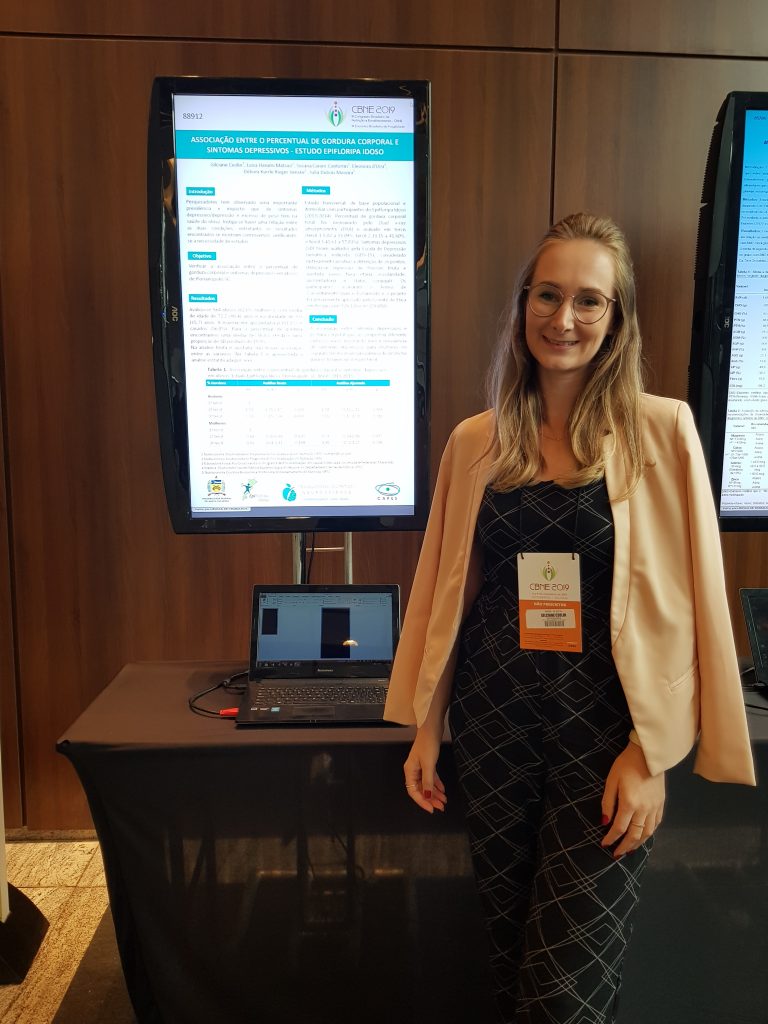
>> Click here to read the report in multimedia format
The researcher participated in events such as the Brazilian Conference on Nutrition and Aging (CBNE 2019). (Photo: personal archive).
Vitamin D and its health benefits have become a popular topic, especially during the COVID-19 pandemic, when information, often false, was circulated on social media with miraculous promises. But we must resort to science to understand its true role in the human body. In addition to being essential for bone health, there is also scope for studies into its effect on mental health.
At the Federal University of Santa Catarina (UFSC), research has helped uncover the link between vitamin D and depression in older people in the state capital, Florianópolis. Based on data from the EpiFloripa Idoso study, it was possible to conclude that older people with a substance deficiency have a 2.27 times greater risk of developing depressive symptoms, compared to those with a normal level. In this vitamin D-deficient group, the long-term risk increased: it was 2.9 times higher after 2 to 5 years of measurement. An international reference has been adopted, considering that less than 20 ng/ml is a deficiency and between 20 and 30 ng/ml is a deficiency.
The study also shows that women, older adults who are obese and those with higher levels of LDL cholesterol tend to have lower levels. The same thing happens with older people who depend more on others for daily activities, such as eating, bathing, and dressing. But there is one factor that helps protect them: physical activity.
This is the result of four and a half years of work on doctoral research Gelsian CeolinShe defended her thesis in 2022 under the guidance of the professor Julia Dubois, from the graduate program in nutrition at UFSC. The research was made possible through a grant from the Coordination of Staff Improvement in Higher Education (CAPES).
The idea arose from a partnership between the Translational Nutritional Neuroscience Study Group and the EpiFloripa Idoso Research Group. DuBois has mentored the researcher since she earned her master’s degree.
“This has been an emerging topic, and globally, there are few studies that specifically address the issue of older people,” explains the consultant.

Ceolin (left) with the NeuroMood Lab research group, at the Center for Neuroscience Studies at Queen’s University, in Canada. Photo: Gelsian Ciolin.
Ciulin says that before his dissertation, he had only found one Brazilian article looking at the relationship between vitamin D and depressive symptoms in older people. In this way, it helps reduce the schooling gap in low- and middle-income countries, where access to depression treatments is less.
The research has been awarded the 2023 CAPES Thesis Prize, in the field of Nutrition, and is in competition for the CAPES Thesis Grand Prize which will be awarded in December 2023.
“It is very interesting, being from the countryside, with few resources, always studying in a state school and on a scholarship at a private university, and facing many challenges along the journey. I hope it will be an inspiration for future PhD students,” comments Ciulin.
For the consultant, the highlight of his work is publishing seven articles in relevant scientific journals. While earning his PhD at Queen’s University, Kingston, Canada, Ceolin worked with a research group in nutritional psychiatry and published two articles in a national and international journal.
I have used several methods to circumvent this particular issue. “In a thesis, we’re telling a story and I think the story is told in different ways, going beyond the main topic,” DuBois says.
(more…)

“Friendly zombie guru. Avid pop culture scholar. Freelance travel geek. Wannabe troublemaker. Coffee specialist.”

:strip_icc()/i.s3.glbimg.com/v1/AUTH_59edd422c0c84a879bd37670ae4f538a/internal_photos/bs/2023/C/5/A4lWrPQSSw0QsBXkdijQ/greve-medicos.jpg)



